The post Friends of Saturday Kids: Abhishek on breaking bread, building community, and enabling strengths appeared first on Saturday Kids | Coding, Digital Literacy for Kids & Parents.
]]>“It really all starts from the conversation you have with a child.”
Sometimes doing good and making an impact is really not as straightforward or as simple as it seems. While we’ve been running Code in the Community and working with corporates to run creative coding classes for kids from under-privileged backgrounds for years, we’re continually learning about how to make digital literacy relevant and impactful.
Thankfully, we get to befriend and learn from change-makers with the ground expertise and who dedicate themselves to working with kids in high need communities on the ground, day in day out. Like Abhishek Bajaj, a community worker who runs 6th Sense, a ground-up movement to respond to community needs in Kebun Baru, a rental flat neighbourhood in Singapore.
Here, Abhishek – who spends his time enabling the strengths of families in this neighbourhood and being abang (brother) Abhi to the kids in this community – shares what he’s learned from his experience, and suggests where those of us who want to do something to help can start.
As a Community Worker, what do you do?
“I’d call myself an enabler who plays the role of facilitating relationships between different groups of people.”
You come from a technical background in data science. How did you end up doing the community work that you do now?
“My journey began when I was growing up in India the first 7 years of my life – I lived in a community of families where we knew each other. At 5.30pm, without fail, we’d all go out and play, and we’d all be well fed and cared for wherever we were. I missed that when we moved to Singapore.
While studying, I worked on a carbon credit project in Sumatra and started volunteering with a non-profit organisation called Ground-Up Initiative – these experiences helped me connect with something I hadn’t felt in a very long time. Later, I did research projects investigating the effects of play on kids and the lived experience of people living in rental blocks.
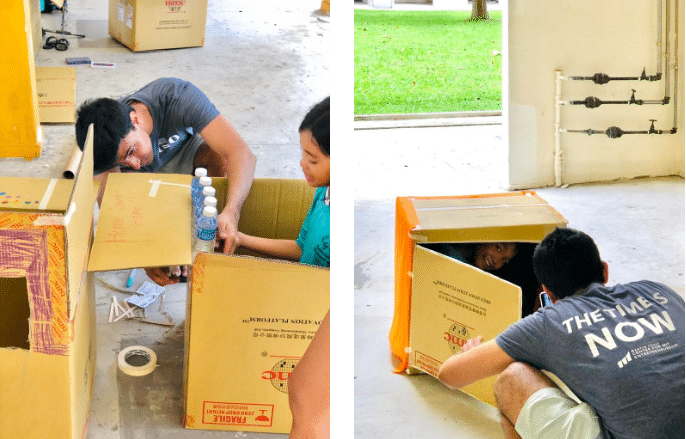
“During this session we asked the kids to use their imagination – some turned these cardboard boxes into homes, some made an ice cream stall.”
I wanted to understand the lived realities of communities and to learn about what it’s really like on the ground, which led me to join Beyond Social Services as a community worker. That set me on the journey I’m on now, where I work with a community of families living in rental blocks at Kebun Baru through an organisation called 6th Sense.”
What does community work mean to you?
“Community work is definitely a two-way relationship. You’re not just giving to someone. I’m learning from the community as well about how to live and how to have an impact on someone else.
When I meet the kids I work with – when they play hide and seek and other void deck games – time goes by in a blur. Their giggles, happiness, shock and all are very raw, pure emotions that help me reconnect with my childhood identity – it means so much to me. I feel very safe when I’m with them.
Going deeper into these relationships helped me find my kids’ different gifts and skills. They are competitive and are very present in their daily interaction, with the desire to have as much fun as possible now. They are not as concerned about the future as they are focussed on what the present holds.
As community workers, we’re not there to scare them about the future – that’s not within the kids’ thinking structure. We’re trying to equip them to survive in a larger economy and environment that’s different from what they’re growing up in.”
What role does education play for the kids you work with in rental blocks?
“In school, their learning focuses on academic skills which are very theoretical, and not really aligned with their lived realities. I believe they would blossom in a system that’s more child-led – where they can set their own objectives, and express their emotions and needs clearly.
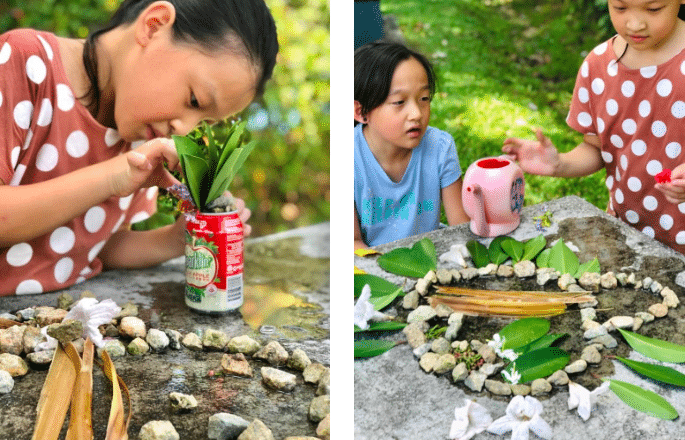
“We want to put across to the kids that play doesn’t need to be expensive but can be made possible with everyday materials.”
My wish for my kids at the age of 7-12, is to have a huge range of free play activities. To be able to practise their imagination, and never feel that there’s nothing they can do. I wish for them a sense of possibility to be and do whatever they set their minds to. Not just in the future, but in the present.
What would benefit them is a child-safe area in rental blocks; currently, there’s no psychological safety there – there’s killer litter, people doing drugs. It’s nearly impossible to learn and play in that environment.”
What advice do you have for well-intentioned students or corporates who are eager to volunteer to help disadvantaged kids and families?
“There are a lot of well-intentioned people who want to help. What I would advise them to do is: to break bread with the families. Sit on the floor and eat with them. Suspend your own value systems; try see things from the families’ point of view and match their cultural nuances.
Break bread with the families. Sit on the floor and eat with them. Suspend your own value systems. Try see things from the family’s point of view.
People generally want to help and see Corporate Social Responsibility as a pathway to reaching communities perceived as vulnerable through social good.
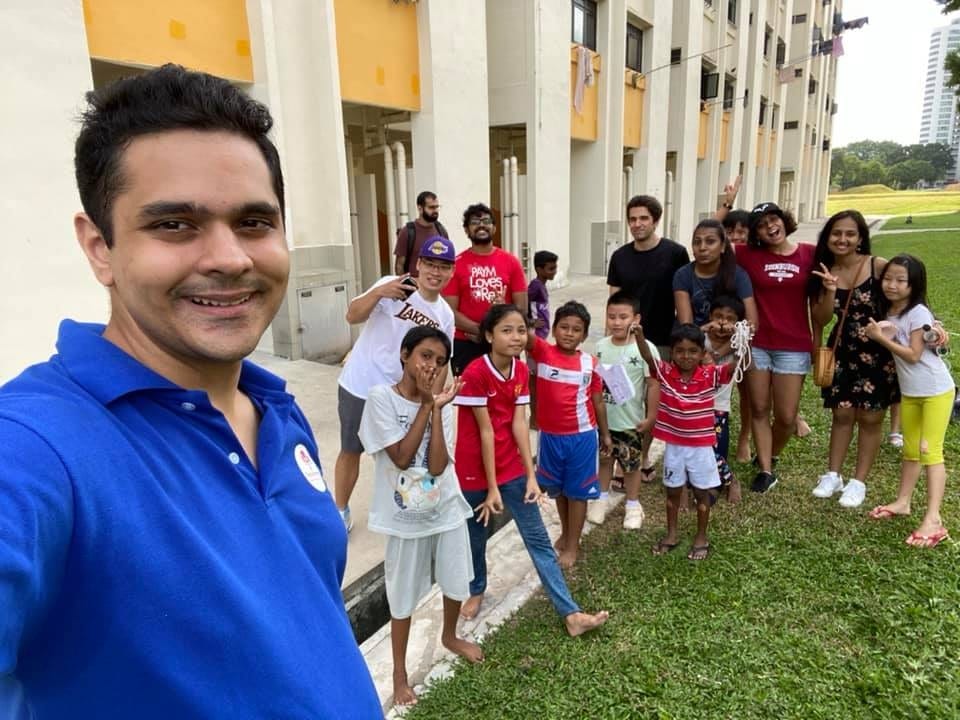 Abhishek, volunteers, and the kids from 6th Sense at Kebun Baru.
Abhishek, volunteers, and the kids from 6th Sense at Kebun Baru.
I think there are some important questions to ask before planning a project: Who defines what is a good? Who owns it at the end of the day? What, really, is your agenda? Many corporates do CSR from an accountability perspective – that’s not wrong, but it’s not always the most impactful way to approach social impact work.
Leaders need to create the right container for these conversations.
Start with where communities are, instead of where you are. Explore from the lens of a child, for example, and then try and understand where your programme or activity fits in.
It really all starts from the conversation you have with a child.
Underprivileged kids should not be seen differently from privileged kids – all kids have so much potential. We need to respect kids, honour their opinions and not take away their dignity. Even if their opinions and values don’t align with your objectives, it shouldn’t stop you from creating an environment where they can succeed – that’s our duty as adults.”
. . .
Want to do something to help? Whether you’re an individual, corporate or student volunteer looking to do good – we hope that this article offers a thoughtful starting point to approach making an impact on kids from disadvantaged backgrounds. If you’ve got further insights on the topic, we’d love to hear from you.
Learn more about 6th Sense and find out how you can support them on their Facebook page!
The post Friends of Saturday Kids: Abhishek on breaking bread, building community, and enabling strengths appeared first on Saturday Kids | Coding, Digital Literacy for Kids & Parents.
]]>The post Saturday Kids goes to Cambodia! 5 things that inspired us from our fieldtrip to the +855 appeared first on Saturday Kids | Coding, Digital Literacy for Kids & Parents.
]]>As any good product or programme designer would know, you can’t build anything meaningful for a user you can’t empathise with. So before kicking things off, we embarked on a fieldtrip to Phnom Penh to listen to the stories of some of the teenagers we’d be working with, understand what digital literacy means in the context of a fast developing country, and explore how we might build useful educational tools to help Cambodian youth to navigate their future.
Along the way, these are 5 things we saw and learned that inspired us:
1. E2STEM Education – a public school leading transformation through self-directed learning
Sometimes you can sense there’s something special in the air just by stepping into a place – to us, the E2STEM campus was one of those very special places!
 Peeking into a class at E2STEM Education!
Peeking into a class at E2STEM Education!
A free public school with a vision to train young Cambodians to transform their country – their curriculum is rooted in an inquiry-based learning approach that looks like nothing we’ve seen in a local public school: scheduled time is set aside daily for self-directed learning, reflections, and extra curricular activities ranging from a guitar club to a coding club. There is a sense of shared ownership over both learning and the big and little responsibilities that come with being part of a community, perhaps best exemplified from the rule that everyone from students to the school principal has to take turns to clean the school toilets.
While the school itself is a small and simple setup nestled within the compound of a larger public high school, there’s a quiet but contagious energy on campus that we wished we could bottle.
2. Code can unlock potential for solving real world problems.
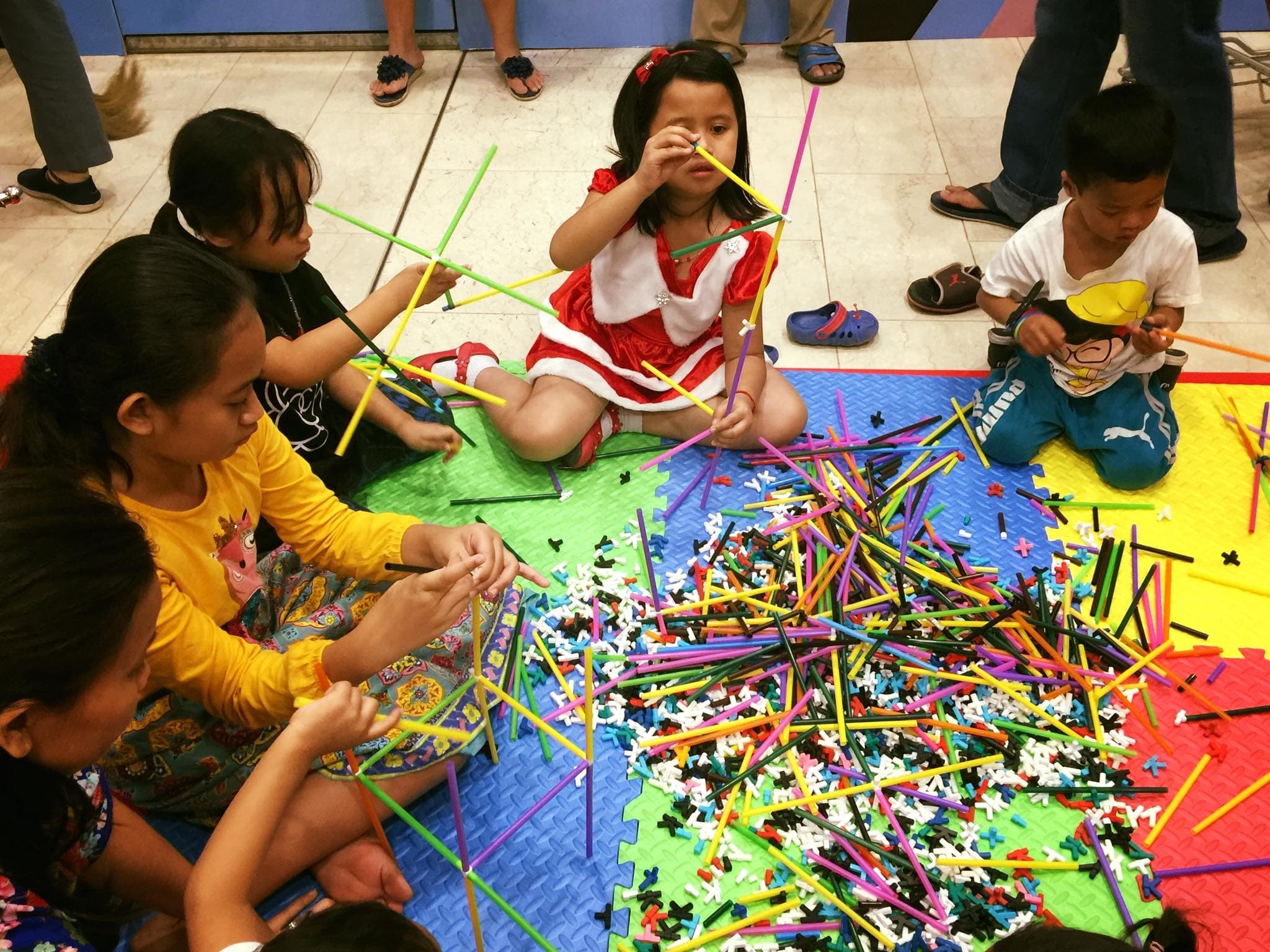 Kids playing with DoyDoy. Credit: DoyDoy on Facebook.
Kids playing with DoyDoy. Credit: DoyDoy on Facebook.
While in Cambodia, we were inspired to experience ground up projects that really embodied how code could fuel ripples that improve people’s lives significantly. Some of our favourites were Tepmancha, an open source flood early-warning flood system for residents in vulnerable areas, and DoyDoy, a low cost STEM learning and innovation tool for kids created by Em ChanrithyKol, a Cambodian entrepreneur and educator, who also happens to be one of our youngest Coding Cats instructors (at the age of 22)!
Get inspired by reading more about Tepmancha, DoyDoy and other projects at the intersection of tech, innovation and social impact here!
3. Entrepreneurship is a powerful tool for transforming lives.
As a social enterprise, we love learning about how business can be used as a tool for social good, and the city of Phnom Penh offers so many examples of thriving enterprises that do just that. On our radar: Friends International with its training restaurant, nail bar, gift shop and other businesses, creates vocational training opportunities for marginalised youth; tonlé trains female artisans while setting a precedent for zero-waste fashion production; and eateries like Bloom Cakes offer alternatives to the sex trade for women seeking them.
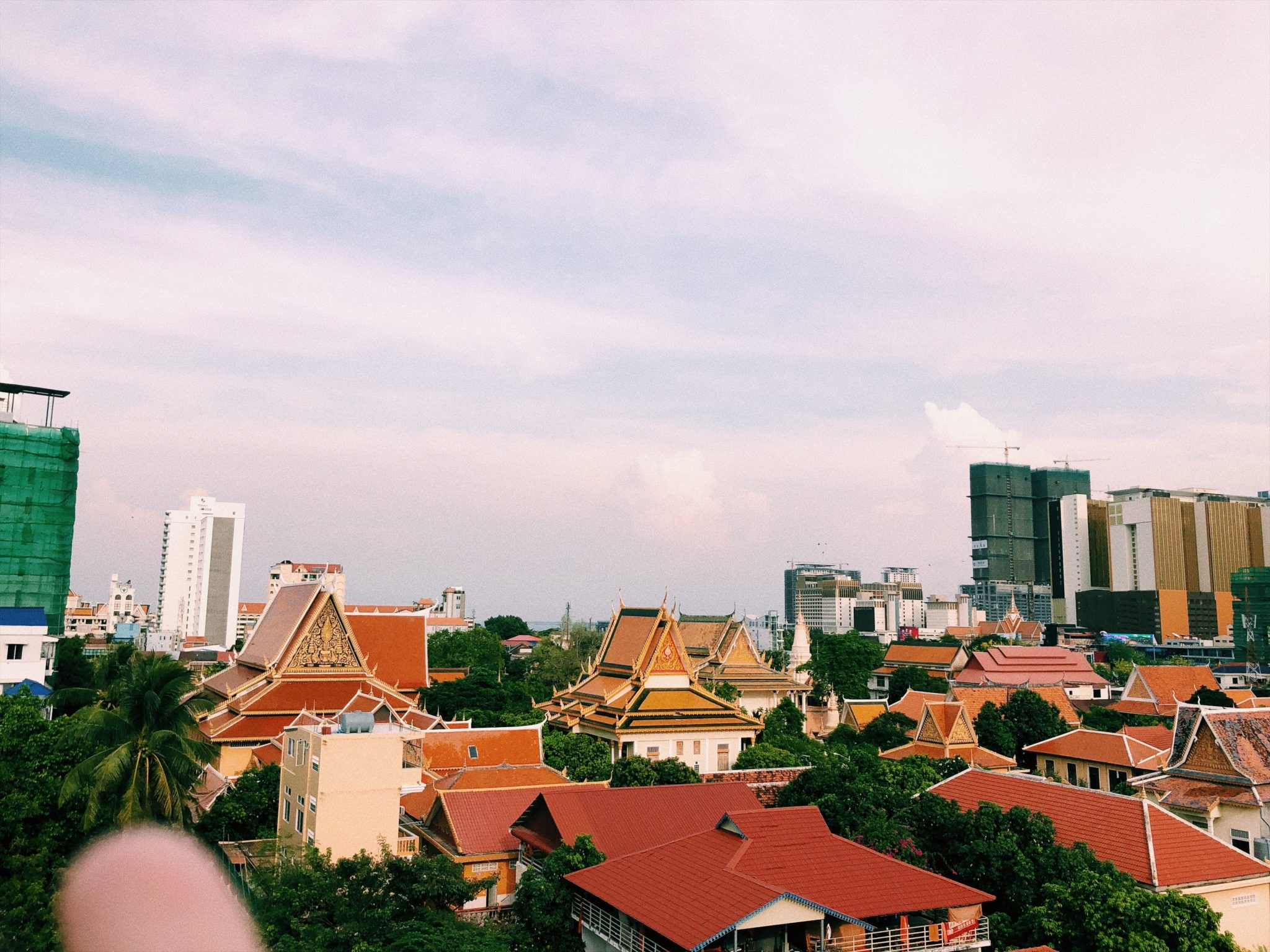 The view of part of Phnom Penh city (and the photographer’s finger): skyscrapers, temples, homes.
The view of part of Phnom Penh city (and the photographer’s finger): skyscrapers, temples, homes.
Too often, Cambodia is mentioned by outsiders in the same breath as words like ‘poverty’ and ‘genocide’, but this over-simplistic characterisation sweeps over the potential and possibility bubbling in the country that we think these (and so many other) social businesses exemplify!
4. Coding & self-directed learning as a medium to bridge the gap.
Coding is a skill that’s in professional demand – while we don’t like to over-emphasise this, we won’t glaze over it either.
While no shortage of coding schools have popped up in Singapore to meet this demand of parents seeking to insure their kids’ future career prospects, we see potential in leveraging the ability to code to bridge the inequality gap.
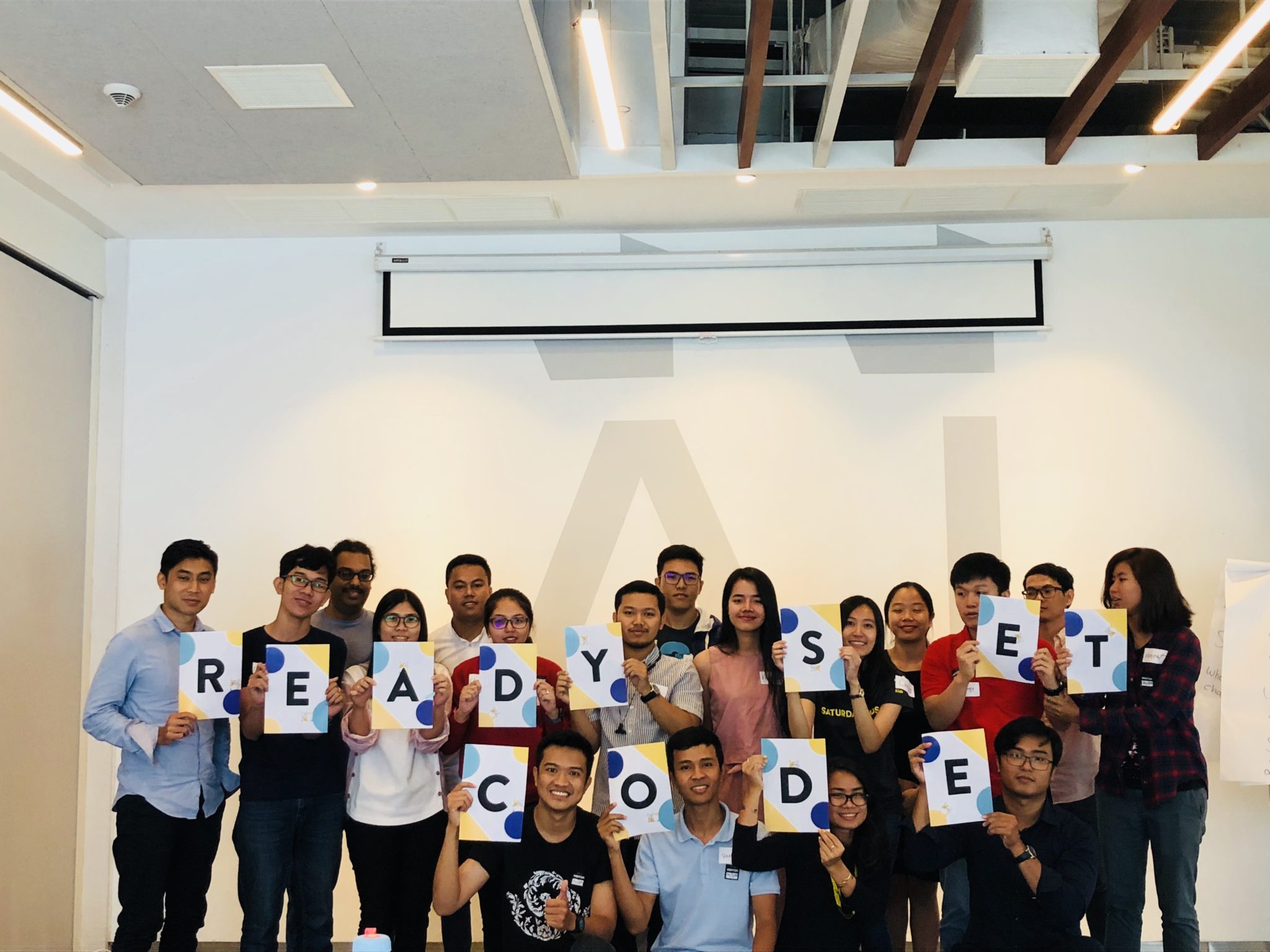 The Coding Cats team in Cambodia!
The Coding Cats team in Cambodia!
Perhaps because coding lends itself better to self-learning than most other skills, with the abundance of free resources available online for those motivated enough to teach themselves, organisations hiring computer programmers are relatively less concerned about where you studied than what you can do. And because of that, youth from less-privileged backgrounds are more likely to have a fair chance at proving themselves professionally, as compared to other fields which emphasise formal academic qualifications.
This is true too in Cambodia, and drives what we do at Coding Cats. While we’re not attempting to make an engineer out of every child we work with, we do hope that every student who discovers a passion and talent for coding is able to use it to prove themselves beyond their circumstances, regardless of their background.
5. Learning together = learning better
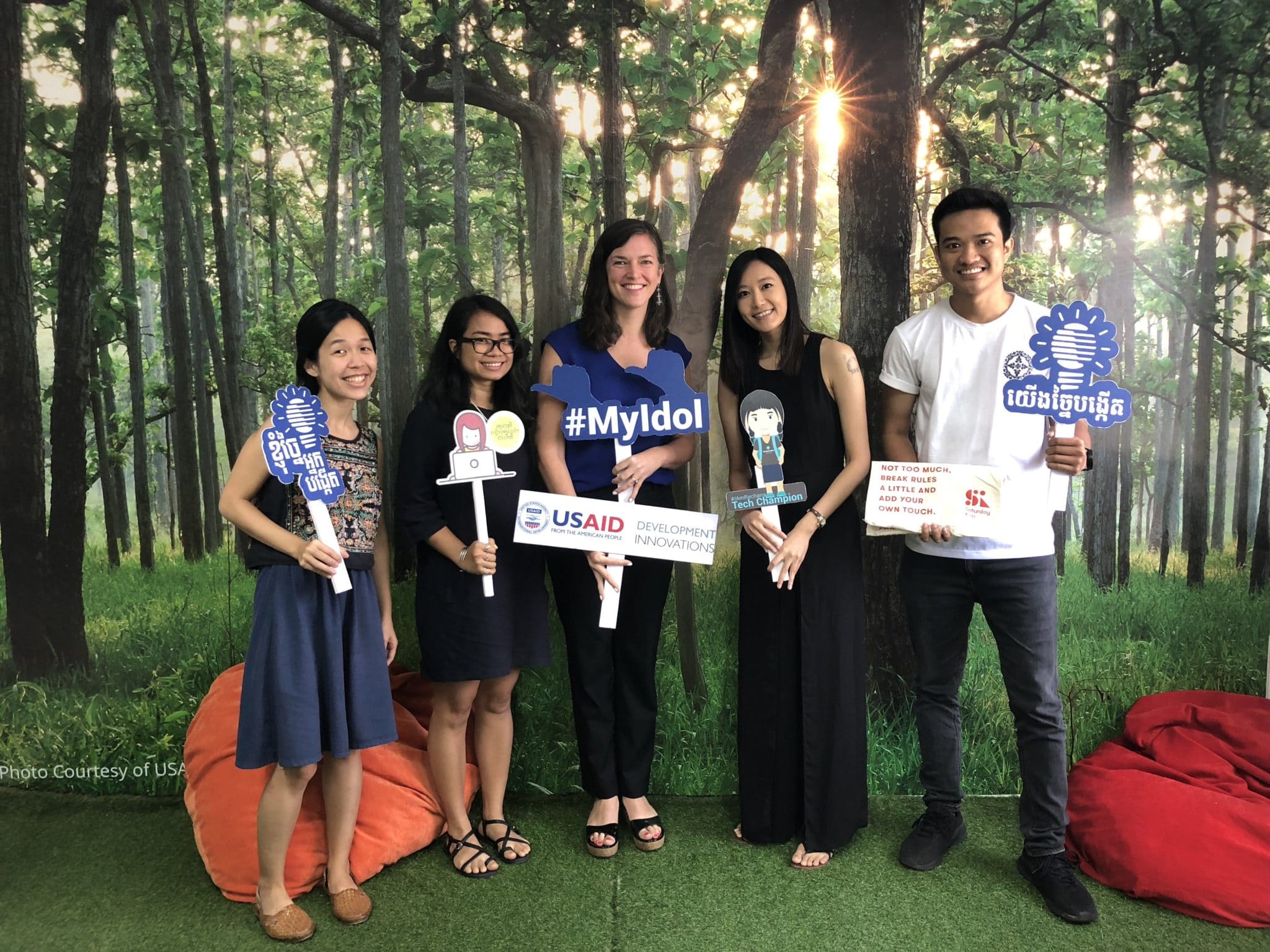 The Raintree and Saturday Kids crew at the Development Innovations HQ.
The Raintree and Saturday Kids crew at the Development Innovations HQ.
Working with funders can be stressful, but our grantor Development Innovations’ approach of learning alongside implementation partners and extracting constructive insights from teachable moments – whether victories or unexpected hiccups – was a breath of fresh air!
We’re reminded of our own approach in the classroom at Saturday Kids where we encourage kids to embrace failure, instructors to be open about their mistakes, and try our best to cultivate a culture of learning together as a collective rather than competition. Among all the cool inventions we got to see, this resonated with us as an insight about what a healthy and progressive partnership might look like.
. . .
Again, we’re thankful to our partners Raintree Cambodia & Development Innovations for their hospitality in Phnom Penh, and for helping to make Coding Cats possible!
If you have any other insights or recommendations to share about the intersection of education, tech and impact in Cambodia, we’d love to hear them. In the meantime, watch this space for more stories from Coding Cats and Saturday Kids’ adventures in Cambodia!
The post Saturday Kids goes to Cambodia! 5 things that inspired us from our fieldtrip to the +855 appeared first on Saturday Kids | Coding, Digital Literacy for Kids & Parents.
]]>